
Daytona Beach-area's James Sotolongo, Ramara Garett & Stephanie Musselwhite maintain their innocence
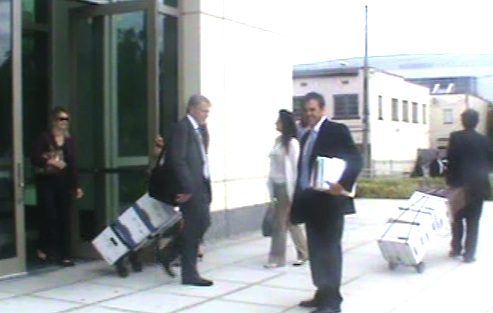 Headline Surfer photo / James Sotolongo stands amid the defense team outside the US District Courthouse in Orlando where a jury began deliberating Friday as to his guilt or innocence in a mortgage fraud conspiracy trial. Sotolongo, his live-in girlfriend and mother of their 1-year-old baby, Ramara Garrett; and a third defendant, Stephanie Musselwhite, have all pleaded innocent to charges. The jury will continue its deliberations on Monday. Also shown in the photo to Sotolobngo's right is his attorney, John Bergandahl, and walking out the courthouse front entraceway is Garrett.
Headline Surfer photo / James Sotolongo stands amid the defense team outside the US District Courthouse in Orlando where a jury began deliberating Friday as to his guilt or innocence in a mortgage fraud conspiracy trial. Sotolongo, his live-in girlfriend and mother of their 1-year-old baby, Ramara Garrett; and a third defendant, Stephanie Musselwhite, have all pleaded innocent to charges. The jury will continue its deliberations on Monday. Also shown in the photo to Sotolobngo's right is his attorney, John Bergandahl, and walking out the courthouse front entraceway is Garrett.ORLANDO -- What is most amazing in the case against James Fidel Sotolongo, Ramara Garrett and Stephanie Musselwhite is that it has has gotten this far.
The jury of seven men and five women got the case 10 a.m. Friday and after deliberating six hours and 40 minutes, indicated to the judge they wanted to go home for the weekend.
The collective looks on their face said it all. Where do they go with this case? What is the point? Who even is the victim?
Even the players are continually coming and going.
Parade of judges coming and going
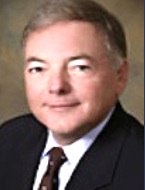
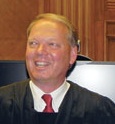
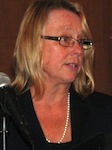 Photos for Headline Surfer /
Photos for Headline Surfer / And before the judge let them go, he let them know that when they return on Monday to resume their deliberations, he won't be there to greet them.
"My son will be sworn in as a lawyer on Monday," US District Judge John Jarvey told the jurors, who appeared stunned. "Judge Conway will take care of you from now on."
Jarvey is a visiting judge from Davenport, Iowa, brought to the Middle District of Florida in January to deal with a case overload.
Conway is Chief Judge Anne C. Conway who inherited the case when Judge Roy B. Dalton, the third judge on the case was forced to recuse himself on a motion brought by the defense and a separate letter from Headline Surfer® based on a review of public records pointing out his gross conflicts of interest in the case against Sotolongo, Garrett and Musselwhite due to his bank's relationship with one of the unindicted co-conspirators, Sidney Coton.
And while Dalton said the media played no role in his recusal letter, it should be noted that four days after writing to the judge, Headline Surfer® followed through and published a story March 13, on Dalton's conflict of interest headlined, "Federal judge in Daytona mortgage fraud case has bank ties with key gov't witness/unindicted co-conspirator."
Later that day, Dalton officially recused himself from the case. The case was then assigned to Conway who then passed it on to Jarvey and the trial was delayed nearly a month.
One of the government's key witnesses against the trio is an unindicted co-conspirator by the name of Sidney Coton of Deltona.
Coton, who has already pleaded guilty to a single count in the fraud conspiracy case had financial issues tied to Dalton's bank while the future jurist held key posts there as director and financial chair on the credit police committee.
Headline Surfer® uncovered the connection during an exhaustive review of online public records searches during the past several weeks of the key players in the trial.
Whether Dalton was aware of a connection -- directly or indirectly -- with Coton, who has been hauled into court in Volusia County by nearly half a dozen lending institutions in property foreclosure lawsuits topping $2 million, is immaterial.
That was the consensus of several prominent attorneys and other well-placed judiciary sources in Daytona Beach, DeLand and Sanford, who agreed to provide insight and analysis on the reporting uncovered by Headline Surfer® after receiving assurances their names and positions would never be publicly divulged under any circumstances for obvious reasons.
"This is a clear-cut conflict of interest for this judge who may be forced to recuse himself from presiding at the trial, even if he didn't have any direct prior knowledge or awareness of this government witness during his tenure as a trustee with this bank in Orlando," a source said.
Another source agreed, adding, "Whether he knew the guy or not -- it really doesn't matter, especially at this point and with the adverse coverage this will generate a week before beginning the pains taken process of picking a jury." A third source said, "
Even if the judge has a strong legal foundation, based on what you've already described with the interaction between this judge and the prosecutor and and the lead accused defendant, even the appearance of alleged impropriety is something no judge is going to want to be a part of. "
The source added, "Think of it like this: This is a conspiracy case involving millions of dollars in middle- to high-end properties and this judge had served as a bank trustee. You don't think the resentment is going to come through somehow?"
Headline Surfer® wrote to the judge in an email 3 p.m. Monday to give him a chance to respond to the internet newspaper's reporting, but it went unanswered:
Prosecutor may not be around much longer either
And with the latest announcement, the jurors will have to forge on without Judge Dalton. And as Headline Surfer® reported exclusively on Friday in a story headlined, "Prosecutor in the Daytona-area mortgage fraud trial in fed court in Orlando appointed to judgeship," Tanya Wilson, the government's lead prosecutor in the case, may not be here for long either.
Wilson was tabbed late Thursday by Gov. Rick Scott for a county judgeship in Orange County. When Wilson leaves her current post hasn't yet been announced.
The jurors heard a complicated rebuttal from the government's No. 2 prosecutor on the case, Shawn Napier, who abruptly left the trial before opening statements even began due to a death in the family. He didn't return until the day before closing arguments.
And how about the prosecution's star witness, James Bartoszak? How apropos that he was the very first witness and its final witness of the nearly two-week trial?
With the case built on the foundation by the FBI, no agent ever took the stand. In fact, the FBI's representation came from Bartoszak, who actually is employed by the Florida Division of Financial Services, a state agency, where as the Federal Bureau of Investigations is exactly as its name implies -- federal.
FBI's case agent and the alleged whistleblower mere spectators at trial
The agent who made the complaint in US District Court is Robert P. Robichaud, II, and though he was in the courtroom every day for the trial he was not on the government's witness list nor was he called.
And the alleged whistleblower, Orlando private investigator Michael Hullet, who first complained about Sotolongo to the Florida Department of Law Enforcement before the case was turned over to the FBI, also sat in the courtroom every day of the trial. And like Robichaud, Hullet was neither on the government's witness list nor was he called on to testify.
For most of the trial he sat in the back of the courtroom with his arms crossed.
And when the FBI's Robichaud filed his 26-page complaint on March 29, 2013, it alleged lending institutions were defrauded $50 million involving 70 upscale residential properties in five Central Florida counties. However, an indictment handed up on April 24, 2013, alleged lending institutions were defrauded of only seven properties, all in the eastern portion of Volusia County totaling less than $13 million.
And though the jury was not told of the larger scale claim, the Daytona Beach News-Journal continually ignored the indictment in favor of the FBI complaint, even though it wasn't part of the evidence at trial.
From the defense's point of view, the government's alleged mortgage fraud case that took nearly four years and the work of three full-time FBI agents to bring to trial -- a case riddled with flaws.
It was a case that even the lead prosecutor tried to dispose of in offering a five-year capped plea to Sotolongo, but Judge Dalton rejected it because of the way the government portrayed him as the alleged ringleader while no such capping was given to Christopher Mencis, the fourth indicted defendant in the case, who copped his guilty plea with no such assurance of a limited prison sentence in exchange for his testimony at trial.
Regardless, Sotolongo, Garrett and Musselwhite went into the trial with the presumption of innocence following them throughout the legal proceedings.
Government prosecutor: 'Skin in the game'
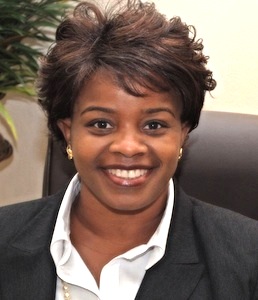
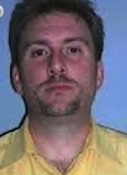
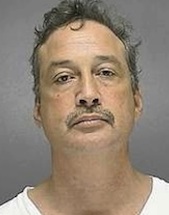 Tanya Wilson, the lead government prosecutor in the mortgage fraud trial, may not be part of the case very long as she was appointed to an Orange County jusgeship on Thuesday by Gov. Rick Scott. Two of Wilson;s witnesses were Christopher Mencis, shown here in the middle, the mortgage broker who was initially indicted, but agreed to testify for the government. The defense attorneys intensely questioned trhe veracity of his testimony, portraying him as a rat looking to save his own skin. Sidney Coton, shown at right, was among several unindicted co-conspuirators who was argumentative and evasive in his answerts on cross-examinination., He, too, acknowledged he had everything to gain in the way of a more lenient sentence by cooperating with the government.
Tanya Wilson, the lead government prosecutor in the mortgage fraud trial, may not be part of the case very long as she was appointed to an Orange County jusgeship on Thuesday by Gov. Rick Scott. Two of Wilson;s witnesses were Christopher Mencis, shown here in the middle, the mortgage broker who was initially indicted, but agreed to testify for the government. The defense attorneys intensely questioned trhe veracity of his testimony, portraying him as a rat looking to save his own skin. Sidney Coton, shown at right, was among several unindicted co-conspuirators who was argumentative and evasive in his answerts on cross-examinination., He, too, acknowledged he had everything to gain in the way of a more lenient sentence by cooperating with the government.And while the government's prosecutor, Wilson, appeared to score points with the jury in her opening statement with a reference to the accused having "skin in the game," she didn't appear to back it up with four distinct groups of witnesses.
Wilson began and ended the trial with the testimony of Bartoszak, who in his second time on the stand, had a chart with pictorials showing the three defendants on trial, but not Mencis or the others. A procession of bankers produced nobody with an outcry of being ripped off.
Mencis, the mortgage broker who turned on the other three by agreeing to testify for the government in exchange for a lighter sentence was mercilessly attacked by the defense attorneys and held up for ridicule as a liar out to dave himself.
And the fourth grouping, several unindicted co-conspirators, while throwing out name associations, were never able to tie any of the defendants to the crimes alleged.
One of them, Sidney Coton, 53, a car salesman from Deltona, kept interrupting Musselwhite's attorney, Bruce Zimet, during cross examination, asking him to repeat the question and as he tried to do so, the witness would interrupt him again.
Wilson declined to talk to Headline Surfer about the trial. The attorneys for Sotolongo, Garrett and Musselwhite, made a calculated decision bot to put them on the stand, believing they had incriminated the government's witnesses and that the jury would see that effort.
Ultimately, though, it''s up to the jury to decide if each of the three or any of the three is guilty or not guilty.
The moment the first witness took the stand, attorneys for the defendants pounced on what they believed were the missing parts of the investigation.
Bartoszak testified for the government as the lead agent on the case. After detailing what the FBI spent the last four years preparing, Sotolongo’s attorney, John Bergendahl hammered away at him, followed by Mencis and a series of unindicted co-conspirators.
Bartoszak conceded in cross examination that no bank has ever filed a complaint of fraud in this case.
And in a rapid-fire line of questioning, it was revealed to the jury that despite all the time on the case, no subpoenas for documents were ever issued to the real estate brokers involved in the transactions, including Garrett, nor for any of the multiple attorneys representing the Sellers.
Even more surprising was when the jury learned that the agents had also not requested all the files from the mortgage broker, Chris Mencis, who pleaded guilty to making false statements to a financial institution related to this case.
The first ‘gotcha moment’ of the trial, however, was when Bartoszak had to admit under cross that neither he nor anyone else in the case interviewed a single underwriter, loan processor, or anyone involved at the lender banks who actually handled any of the transactions in question.
Bartoszak’s response was “it was not pertinent at the time of our investigation.” It's a refrain he would use over and over again.
Stephanie Musselwhite’s attorney, Bruce Zimet, quickly followed up by pointing out that there were no emails or any form of communication provided in the voluminous discovery from the lender banks.
Bartoszak reluctantly conceded to Zimet that no attempt had been made to locate or request any communication between the banks and the mortgage broker on the seven properties, Mencis.
The prosecutor, Wilson, brought in a series of representatives from the lender banks in the case and while they answered questions favorably to the government, when it came to cross examination, holes in the government's case were readily apparent.
All of the bank representatives conceded that in each transaction, the "HUD 1" or closing statement, with all the disbursements the government contended were illegal, had in fact been disclosed and approved by the banks in question.
This dealt a serious blow to the case as full disclosure is a complete defense to any allegation of fraud, the defense team argued in closings.
Additionally, the bankers who testified for the government all confirmed that the only person who had communication with the banks was the mortgage broker, Mencis.
'Perry Mason moment'
The most notable moment of the trial occurred during the testimony of a witness Brett Hellstrom, a loan officer for JP Morgan Chase, who testified as to a $2.35 million mortgage back on Oct. 27, 2006 initially under a prior mortgage provider, Washington Mutual, for an upscale home at 4249 S. Atlantic Ave., Port Orange.
The prosecutor showed a fax cover sheet to the bank from defendant Musselwhite, which stated she had received a deposit of $50,000 for one of the properties.
After numerous questions to the banker, Hellstrom, he testified stated he never saw a check, and there wasn’t one in the book of pertinent documents prepared by the prosecution for him to discuss. The day ended on that note, with the jury clearly thinking this was proof that Musselwhite had, in fact, lied to the bank.
However, things quickly changed the following morning.
Musselwhite's attorney, Zimet, began his cross examination of the bank witness, Hellstrom, by showing the same fax cover sheet. He pointed to the corner and asked the witness to read what it said.
Hellstrom responded, “1 of 2," to which Zimet then asked if he had been provided page 2 in the book created for him. The jury waited in anticipation as he searched for the document, but to no avail.
Finally, Zimet introduced that second page, marked as a defense exhibit, of the document originally from Washington Mutual showing that indeed Musselwhite, a title insurance specialist, had provided for the $50,000 escrow instead of pocketing it as she had been accused.
Zimet then raised his voice, asking the loan officer, if he could explain why the government had not fully "prepared" the document for his testimony asking if perhaps they simply forgot? Hellstrom at a loss of words, shrugged his shoulders and replied he had no answer.
The prosecutor, Wilson, sat stunned, looking at her assistants with bewilderment, a Perry Mason moment, where the eyes of the courtroom were on her in what was either a serious oversight or an intentional withholding of evidence. Either way, it was an opening the defense had seized upon.
One of the more lighthearted moments came when Abdul Rifai, or "Orlando Jack" as he was identified, took the stand. While not charged in this case, it quickly came to light he had actually received the bulk of all the proceeds from the transactions.
Despite answering questions from the prosecutor without any problem, once Sotolongo’s attorney, Bergendahl, began his questioning, Rifai suddenly struggled with his ability to understand the English language.
After several hours on the witness stand, even the prosecutor seemed frustrated with Rifai's testimony. Despite bank documents that showed his company, Century Motors Financial, deposited over $25 million in the three-year period in question in the trial, he denied he made more than $10,000 per month.
Bergendahl asked if he paid the $23,000 of monthly expenses listed on his unemployed wife’s credit report, Rifai responded “yes, so?” Several members of the jury shook their heads in disbelief as he continued to deny his income, despite the evidence the defense attorneys showed him, including multiple bank accounts with several hundred thousand dollars and a business ledger showing almost $2 million in shareholder disbursements to him personally in 2007.
Most surprising was that after all the evidence showing significant income to Rifai during the years in question, the government continued to parrot the allegation that Rifai didn’t make the income stated on his applications to the banks.
Government witness Bartoszak's refrain: 'Not relevant to my investigation'
After multiple government witnesses contradicted each other, identified as "straw buyers" and all pointed the finger at mortgage broker, Mencis, for the misstatements on the applications, Bartoszak took the stand to summarize the case for the government. This time the government provided charts to show the alleged flow of money in the transactions.
While the defendants’ pictures were prominently displayed on each chart, Bartoszak could not explain why he had not included all the details of the transactions on the charts.
“It was not relevant to my investigation” was the phrase heard over and over while he was cross-examined by the defense lawyers.
Many critical parties in each transaction were not included on the charts such as the mortgage Broker Mencis, the sellers, the sellers' realtors, the sellers' attorneys nor other realtors who represented the same buyers.
Also, attorneys showed that key facts of the financial side were missing or incorrect, including the actual date checks were provided to the title company and the accounts those checks came from.
Regardless, Bartoszak continued to defend the charts and contend they were accurate despite acknowledging the items missing, or incorrect pointed out by the attorneys.
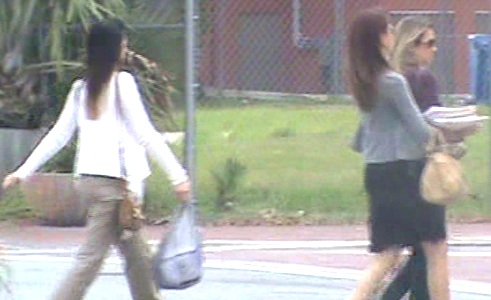 Headline Surfer photo / Ramara Garrett, far right, leaves the US District Courthouse Thursday with two of boyfriend Jamess Solongo's older daughters.
Headline Surfer photo / Ramara Garrett, far right, leaves the US District Courthouse Thursday with two of boyfriend Jamess Solongo's older daughters.In closing arguments, the defense attorneys again pointed out the missing parts of the investigation to the jury.
Bergendahl suggested that instead of conducting surveillance on homes three years after their purchase, Bartoszak could have used that time to call the actual bank personnel that dealt with the loans in question.
Musselwhite's attorney, Zimet followed up by telling the jury Bartoszak wasn’t even an FBI agent, pointing his finger in his direction at the government's table, but rather a state employee on loan to the FBI Task Force, who intentionally hid documents from the jury.
Garrett’s attorney, Brian Phillips, finished the closing arguments by reminding the jury Bartoszak had told the jury his investigation revealed Ramara Garrett never lived at property that had her name on a lease, only to be shown bank records and drivers's license records in the government’s own discovery that clearly showed she did, in fact, live there at the time of the lease provided.
The way Jim Sotolongo sees it, "It will now be up to the jury to decide if the flaws in the government’s case, coupled with what the (defense) attorneys insists are clear misstatements to the jury by Bartoszak, will have an impact on their decision in the trial."
Sotolongo, limited in his words on the advice of his attorney because the jury is continuing its deliberations, told Headline Surfer, "The government's case has more holes than a slice of swiss cheese."
Sotolongo, limited in his words on the advice of his attorney because the jury is continuing its deliberations, told Headline Surfer, "The government's case has more holes than a slice of swiss cheese."
